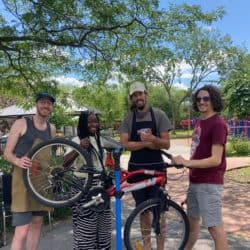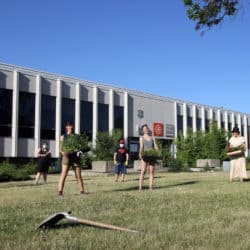Montreal non-profit Insertech trains unemployed adults to repair electronic appliances considered waste and offers them to the public at affordable prices – with a mandate to broaden access to technology while they’re at it.
Non-profits tackle big problems: poverty; inequities in health, education, and work access; sexual and racial discrimination; refugee crises; food insecurity; community development; et cetera. But a cross-cutting challenge calls for their contribution at another level: the climate crisis. In our Mission Transition series, The Philanthropist Journal examines why non-profits should make the socio-ecological transition a core driver of their strategy – and how to do it. In the coming weeks, we will present seven organizations with very different missions, all contributing to the transition in their own way. In our first profile, we feature the circular economy model of Montreal’s Insertech, which trains unemployed adults to repair electronic appliances considered waste and offer them to the public at affordable prices.
Insertech (Montreal)
Marie-France Bellemare, executive director
Mission: job insertion and electronic waste reduction
What is Insertech?
Insertech was created in 1998 to facilitate young adults’ socio-professional insertion. We work toward a more inclusive society – more united, and more concerned about its environment. Every year we offer short-term (six months) working experience to 50 unemployed young adults to build their confidence to fully participate in the economy and take charge of their futures. We train them to repair and update electronic appliances that organizations donate to us because they have bought new ones. Those computers are sold to the community at a low cost. That first mission led us to develop a second one: by reusing and repairing appliances, Insertech contributes to the fight against overconsumption, excessively rapid obsolescence, pollution, and the waste of resources. And we recently expanded our impact through a third mission: technological democratization. Giving access to affordable computers is only half of the solution. Technological literacy is not evenly distributed. Insertech provides classes in senior residences and to beneficiaries of non-profits and online support to address this gap.
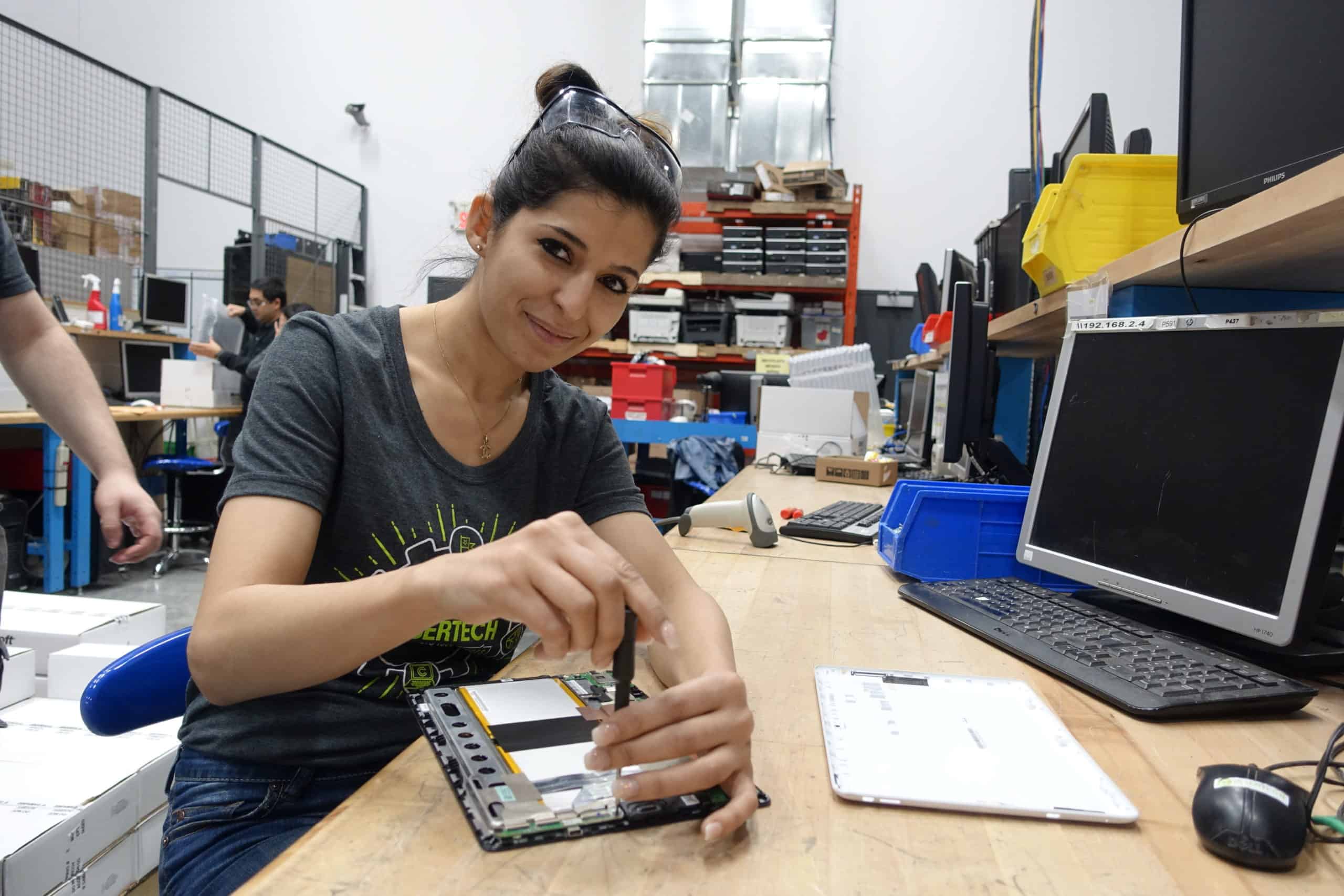
What is your definition of the socio-ecological transition?
It is the necessary transformation toward a new economic and social model. It can create opportunities, but only if they make sense for the environment and the people. And this transition should be based on solidarity and equity or it won’t gather enough support.
How does Insertech contribute to this transition?
We train unemployed adults in jobs based on a circular economy. A circular economy contributes to the ecological and energy transition in many ways. Ours is the collection of material considered waste and its renovation to create products that are offered to the public at affordable prices. The reuse and repurposing of goods creates economic value without harming the environment. And by also addressing the digital divide [between those who have access to good internet and those who don’t and between those who are comfortable with technology and those who aren’t], we make sure that technological progress really means progress for everyone.
The transition will cause the phasing out of “brown” industries and many jobs. So how does Insertech contribute to a just transition?
We need massive job creation in industries that respect a sustainable economic model – jobs for workers of the “brown” sectors and for workers entering or reentering the world of work. Our interns get job experience and learn skills, but they do so in an industry full of opportunities. We offer sustainable reinsertion.
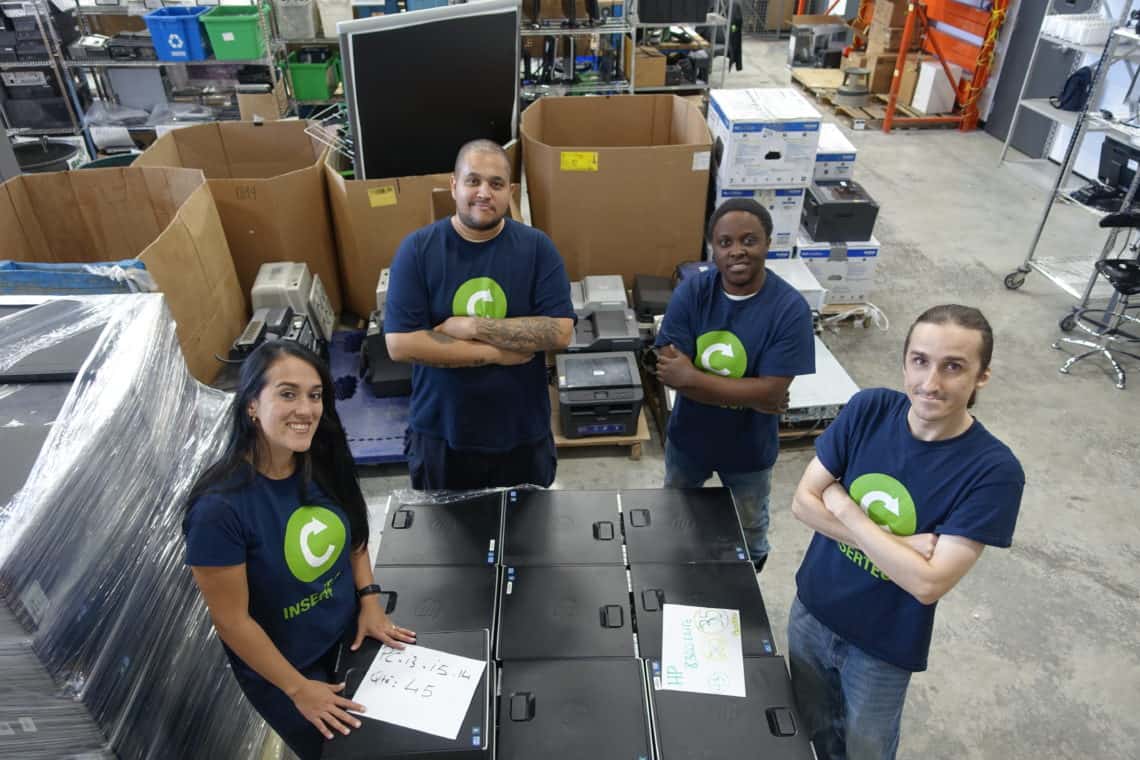
How does your service work?
Most of our agreements are with big corporations, like Énergir, Aéroport de Montréal, HEC Montréal, and STM [Montreal’s public transit corporation]. We pick up the electronic appliances at their office and bring them back to our technicians. We erase the data, repair or change some parts, and sell the computers in our boutique or online, 30% below the retail price for a comparable new model.
What is your primary challenge?
It is education and behavioural change. For decades, recycling has been presented as the solution to our environmental challenge. Unfortunately, reuse and repurposing are blind spots. Citizens and corporations do not think of giving a second life to their electronic appliances. They just look for a “green way” to dispose of them. We have to fight this reflex. The longer we use an object without transforming it, the better it is for the environment. That is called reuse. That is what Insertech does. Life-cycle studies on electronic appliances conclude that reuse is nine times more advantageous for the environment than recycling. The last report of Le Bureau d’audiences publiques sur l’environnement on the management of final waste was unequivocal: Quebec’s government has focused too much attention on recycling at the expense of other waste-management strategies. What is ironic is that reuse and repurposing offer better-quality jobs than recycling.
What are your revenue streams?
More than half of our revenues (55%) are generated by selling the material we collect from various organizations. A grant from Services Québec [the one-stop entry point for the provincial programs for citizens and organizations] covers the salaries of our interns, their trainers, and our employees (35 to 40% of our revenues). We complete our financing with diverse grants, offering free workshops and support for digital inclusion.
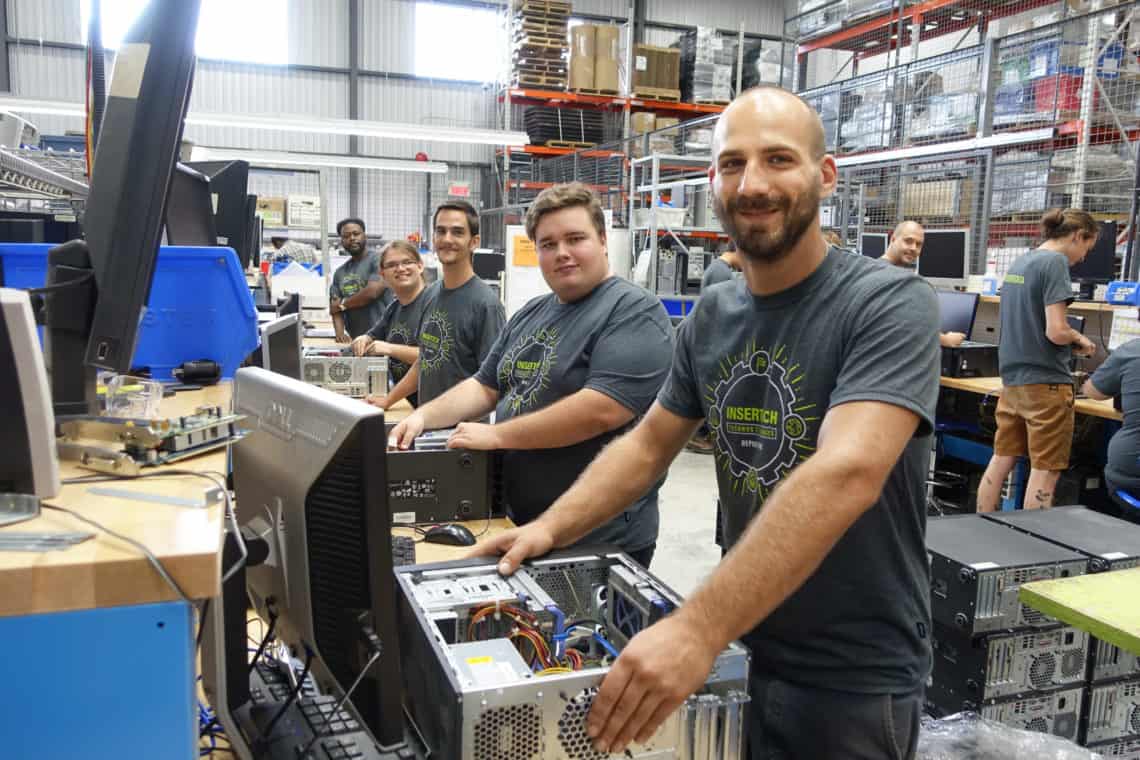
What could you do with more financing?
We could trigger systemic change. Our vision is a network of non-profits across Quebec replicating Insertech’s threefold mission. Our inspiration is France’s Réseau Envie. First, Envie collects, renovates, and resells electrical and electronic equipment. The waste collected is repaired, tested, and then resold at an affordable cost (30 to 60% cheaper than new equipment), with a minimum one-year warranty. It also collects unused medical devices (wheelchairs, medical beds, etc.) to repackage them and distribute them at “solidarity” prices, with all the guarantees and regulatory compliances. All of Envie’s activities are part of the circular economy: a service for the sale of spare parts for reuse developed in Strasbourg, a waste-sorting unit for construction sites conceived for the first time in Brittany, the collection and processing of mattresses in several branches, et cetera. Réseau Envie is a national federation serving its members, local social enterprises.
What role do you see for the philanthropic sector in transition?
It could accelerate the transition. The transition is about humans, not technology. Technology won’t save us; it comes in the end. Transition is first about humans who talk to each other, organize, share, and pool. Technology and recycling come into play once we have reduced, reused, and repurposed. Foundations collaborate with humans who want to make the world better. But they work in silos. Transition is a horizontal movement influencing all aspects of society. We need to develop a new narrative where social philanthropy considers the environmental impact and vice versa. That is a job for non-profits like Insertech and a vision to elaborate for the foundations.
***
Read more in the Mission Transition series.
